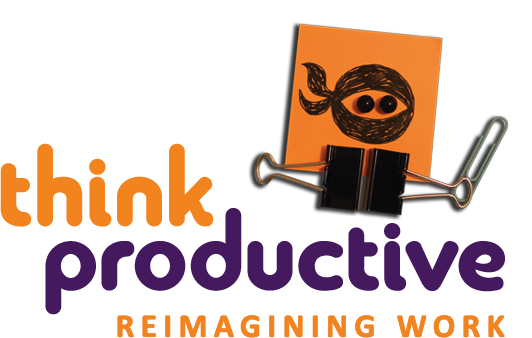Chairing Meetings Like a Productivity Ninja
Depending on your role, you are probably spending 35% – 50% of your time in meetings. Without top-notch meeting skills from both the chair and participants, these meetings will be dreaded and feel like a waste of everyone’s time. Here at Think Productive Australia we are big fans of saying ‘No’ to meetings, but at the same time we appreciate that there are meetings that you simply have to attend. Luckily there are effective and easy-to-implement ways to make your meetings more productive and overall more enjoyable. Here’s a quick guide on where to start…

Read this Before Chairing Your Next Meeting!
We’ve all sat in meetings which felt like they’ve lasted for days and yet nothing has been accomplished. Simply attending a meeting can often feel like hard work in itself, but what’s even worse is chairing a meeting and realizing half of the room is on their phone and the other half is constantly looking at their watch.

3 Steps to Better Meetings
All of this will be yesterday’s news after you implement these 3 steps to boost your meeting facilitation skills:
1) Start Time
Tell people when the meeting’s going to start and tell them when it’s going to finish. You’re invited to a meeting and you’re told what time it’s due to start. But how often are you told when it’s due to finish? Not often enough. If you’re setting up the meeting you can do it differently. Do everyone a favor and be clear about your starting and finish times: We’ll start at 10 am and finish at 11 am. Easy.
2) Who Can’t Stay?
If you’re chairing it (and you might want to suggest this to the Chair if you’re not), ask the assembled company something like ‘Is there anyone who has to leave before the meeting ends at 12?’ Then you’ll have that person’s attention right through to when they have to take off – they won’t be distracted by wondering how they’re going to try to slip out unnoticed.
3) Checkpoints work
Part way through the meeting try this: ‘We’re halfway through our meeting so we’ve got another hour before we finish’. Then, ‘we’ve got half an hour left’. ‘We’ll be finishing in 10 minutes so shall we check that we know who’s doing what’. You can find your own wording for this, but by keeping a note of the timings, you’ll give people a better sense of structure and will manage to keep them concentrated on the subject, rather than their eyes wandering to the clock every so often.

Define YOUR Agenda
At the heart of every meeting, there is a secret agenda, no matter what the official agenda might say, and you need to define your distinctive contribution. Why are you in this room? What will you get out of this meeting, and what are you contributing?
Answering these questions, will not just keep you motivated and concentrated, but if you can’t find answers to them, you might want to decline the meeting invitation.
It All Starts with the Invitation!
For many of us opening up emails fills us with dread, and opening up a “gazillion” meeting invites certainly doesn’t make anybody’s day brighter. One way to change this is certainly to revisit your meetings calendar and seeing whether there are any meetings you and your team could eliminate or amalgamate. Is there anything that could be turned into an email conversation rather than another meeting?

Once you’ve deleted everything you can delete, start revisiting your meeting invitations. Make them as clear and easy to understand as possible. Here are some quick-to-implement tips for your next invitation: (and don’t forget to share this with everyone else sending out invitations, so everyone will benefit from the new technique):
1) Change Up the Length
Instead of a half-hour or hour-long block, make your meetings 20 minutes or 45 minutes long.
2) State Your Aim
Instead of just providing a general title, provide a one-sentence aim for the meeting that starts with: “By the end of the meeting, participants will…”
3) Come Prepared
Outline what you want participants to do in advance – either to prepare, or bring along, and specify if any part of the meeting is to be chaired by someone else.
You’ll be amazed at how much more focused people will be just from these three simple changes within your initial invitation.
Heading into your next meeting? Keep these tips in mind and prepare to be amazed at how much more productive your meetings will start to be!
By Hannah Urbanek
Hannah is Think Productive UK’s Head of Marketing and the voice behind much of our global social media and editorial content. You can connect with Think Productive Australia directly here or connect with Matt Cowdroy on LinkedIn.
[vc_cta h2=”Before You Go…” txt_align=”center” color=”violet” add_button=”bottom” btn_title=”I want more productive meetings” btn_color=”warning” btn_align=”center” btn_link=”url:https%3A%2F%2Fthinkproductive.com.au%2Fproductivity-workshops%2Fin-house-workshops%2Ffixing-meetings%2F||target:%20_blank|”]Our team is on a mission to change the way the world thinks about meetings. Moving away from your calendar being booked back to back with meetings and having to sit through boring and unproductive meetings. Sounds good, doesn’t it?
Find out more about our 3-hour Effective Meetings Training and chat to us to find out how this Workshop could make your whole team happier and save you a bit of money too.[/vc_cta]
